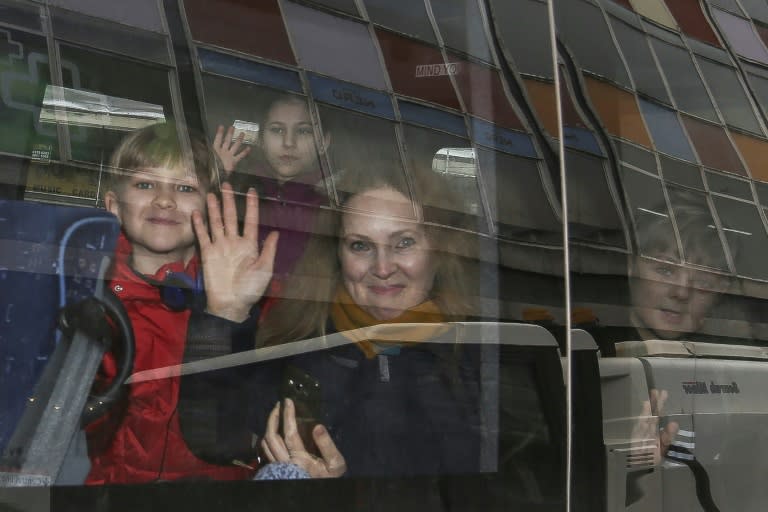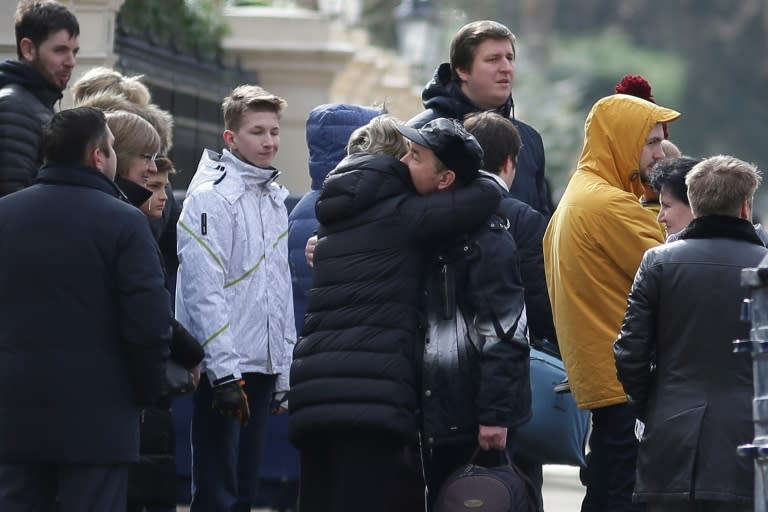Expelled Russian diplomats leave London embassy
Russian diplomats expelled from Britain in the worsening spat over the poisoning of a former double agent left the London embassy on Tuesday with their families in tow. Britain has thrown out 23 Russian diplomats following the March 4 nerve agent attack on Sergei Skripal and his daughter Yulia in the English city of Salisbury. People hugged outside the embassy in Kensington before boarding a waiting fleet of diplomatic vehicles. Around 80 people in total were thought to be leaving. "Focused action has been taken to dismantle the Russian espionage network in the UK with 23 undeclared intelligence officers who were expelled from the UK leaving the country," British Prime Minister Theresa May's spokesman said. Moscow denies any involvement in the attack, which has drawn strong condemnation from Britain's allies in NATO and the European Union, and responded with its own diplomatic expulsions. Britain has also cut off high-level contacts, tightened its border checks and is working on a new law to sanction human rights abusers. May's spokesman said Tuesday it was "actively considering" other measures, but a meeting of her National Security Council took place with no new announcements. - EU to 'coordinate' on consequences - The EU has expressed its solidarity with Britain, and leaders at a summit later this week will agree to "coordinate on the consequences" for Russia, according to a draft statement seen by AFP. But they will stop short of mentioning sanctions, saying they will wait to see what answers Moscow provides on the attack. US President Donald Trump meanwhile did not raise the issue in a phone call with Russian President Vladimir Putin on Tuesday, the Kremlin said. Trump had joined the leaders of France and Germany last week in blaming Russia for the attack, but said he called Putin to congratulate him on his re-election on Sunday. EU Commission chief Jean-Claude Juncker also drew criticism for urging Putin on Tuesday to help "re-establish" continental security cooperation. The head of May's Conservative Party group in the European Parliament, MEP Ashley Fox, said Juncker was effectively "appeasing a man who poses a clear threat to western security". The first offensive use of chemical weapons in Europe since World War II has plunged relations between Moscow and London into crisis. Britain says only Russia had the capability, motive and intent to be behind the attack, which used the nerve agent Novichok reportedly developed by the former Soviet Union. Putin dismissed this as "nonsense". In a phone call with May, Japanese Prime Minister Shinzo Abe voiced his "outrage" over the attack and urged Moscow to respond in a serious manner, her office said. - 'Carelessly applied' - The British counter-terror police investigation is one of the largest and most complex it has ever undertaken and is expected to take several months. Around 250 detectives are examining 400 witness statements, nearly 800 items that have been seized, and 4,000 hours of security camera footage. Skripal, 66, a former Russian officer who sold secrets to Britain and moved there in a 2010 spy swap, remains in a coma along with his 33-year-old daughter after they were found unconscious on a bench in Salisbury. Investigators from the international Organisation for the Prohibition of Chemical Weapons arrived in Britain on Monday to collect samples of the nerve agent. Testing in international laboratories is expected to take at least two weeks. A Russian scientist told state media Tuesday that he worked on an official programme to produce Novichok, contradicting Moscow's claims it never developed the nerve agent. Leonid Rink, who told RIA Novosti he worked on a state-backed programme up to the early 1990s, added that the Skripals would be dead had Moscow been involved in his poisoning. "They are still alive. That means that either it was not the Novichok system at all, or it was badly concocted, carelessly applied," he said. Rink said he worked with a large group of specialists at a state laboratory for 27 years and the development of Novichok formed the basis of his doctoral dissertation. Moscow has denied it ever had such a programme and Russia's foreign ministry told AFP on Tuesday this remained its position. Moscow said it had invited all ambassadors to Russia to a meeting with foreign ministry experts to hear its views about the poisoning. rjm-burs/ar/bp



